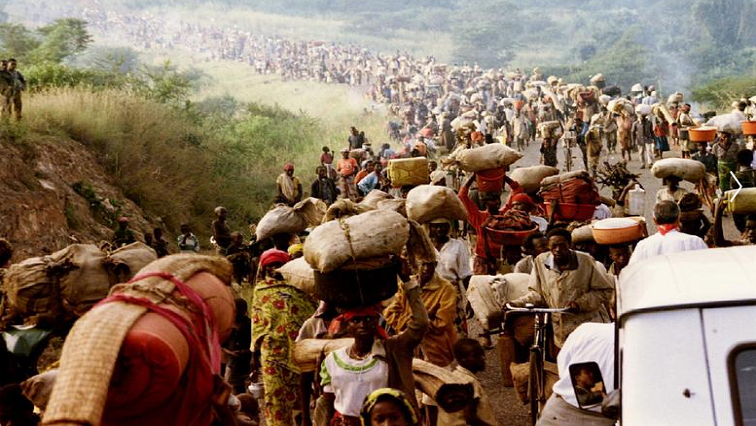This week we focus on the apartheid government’s weapons scandal.
On August 21, 1994, Archbishop Emeritus Desmond Tutu expressed disgust over apartheid South Africa’s selling of arms to Rwanda and the Sudan.
Information on the regime’s sale of arms to countries with serious human rights problems, where an influx of weaponry could significantly worsen ongoing abuses, emerged in 1994 in a Human Rights Watch report.
“It is appalling that it is South Africa’s arms which had been used in Rwanda and the Sudan,” said Tutu.
The human rights activist’s remarks came amid gross human rights violations in Sudan, which were still underway five years after a military coup overthrew an elected civilian government.
Rwanda was on the other hand still reeling from a genocide, which killed almost a million Tutsis and moderate Hutus in just 100 days.
Weeks after the attacks began, Tutu appealed to the world during a speech at the United Nations Human Rights session in Geneva, Switzerland, for the world not to turn a blind eye to the harrowing developments in Kigali.
Listen to his plea below:
The Rwandan tragedy happened at the same time with South Africa’s transition into democracy.
The apartheid government, through its arms company Armscor, had sold infantry weapons worth millions of rand to the Rwandan government between 1980 and March 1992.
This was despite the knowledge that the weapons were to be used in a genocide that claimed over 800 000 lives between April 7 and July 1994.
Thousands others were raped and tortured. Most of the victims were Tutsis, but Hutus opposed to the genocide also came under attack.
While the ethnic cleansing had long been planned, the shooting down of a plane carrying President Juvenal Habyarimana, who was a Hutu, sparked the violence.
Those behind the rocket attack were never found.
Watch special report on Rwanda below:
It later transpired that the arms industry continued selling weapons and re-arming the defeated Hutu forces in June 1994.
The move was in violation of a May 1994 United Nations embargo and was done behind democratic government’s back.
A leaked unpublished United Nations report fingered former President PW Botha’s last private secretary Willem Ehlers as having been a broker in the deal.
Ehlers however claimed to have been duped into believing the consignment was for the Zairean armed forces.
A Human Rights Watch report also revealed that several planes with arms had flown from South Africa to Zaire in 1995.
While government arms wing, Armscor, denied any involvement – it has hinted to a possibility of the country’s arms ending up in Rwanda. According to the company, the last officially-sanctioned South African arms shipments were in February 1993 while the Hutu government was still in power.
In a bid to breakaway from the apartheid regime’s dark military past, the democratic government in 1997 announced an open weapons trading policy, which would be in line with the country’s foreign policy steeped in respect for human rights, internationalism and adherence to international conventions on nuclear and conventional weapons.
Watch government’s announcement of a new weapons trading policy:
The scandal didn’t dent relations between Mandela’s government and the Rwandan Patriotic Front (RPF) government.
However, relations over the years have been shaky with Kigali expressing concern over South Africa’s welcoming of dissidents accused of terrorist attacks in Rwanda.
The spat escalated in 2014 when Pretoria expelled three Rwandan diplomats.
Rwanda hit back and expelled six South African diplomats.
Pretoria had been upset over the killing of former Rwandan head of intelligence in a Sandton hotel, Patrick Karegeya, in December 2013.
He was living in exile in Johannesburg at the time of the incident.
Karegeya’s death had been preceded by a 2010 assassination bid on Faustin Kayumba Nyamwasa.
Nyamwasa is a former army general and Kagame’s former top aide.
There have been three attempts on his life so far.
Four men were sentenced to eight years in jail for the 2010 attempt on him. Magistrate Stanley Mkhari found three Tanzanians and one Rwandan guilty of a “politically motivated” plot to take out General Nyamwasa. They will be repatriated back to their home countries after serving their sentence.
Diplomatic headache
Nyamwasa and Karegeya were sentenced in absentia in 2011 for threatening state security, among other charges.
They are founder members of the Rwandan National Congress, a political party said to be the biggest threat to Kagame’s rule.
Rwanda wants South Africa to bring the former general home to serve his 24-year-jail term.
Pretoria has, however, rejected the request.
It has largely ignored an appeal from Spain for the same, saying it is considering the motion.
Spain wants Nyamwasa prosecuted for alleged war crimes linked to the 1994 genocide.
Spain is one of a few countries that claim universal jurisdiction.
That’s the right to try the worst crimes, no matter where in the world they occur and even if they don’t involve their own nationals in any way.
While some of Nyamwasa’s alleged victims were Spanish, most were either Rwandan or Congolose.
.Watch discussion on why he fled Rwanda:
Attack on Sisulu
Cracks again appeared in 2018 after Rwandan Deputy Foreign Minister Olivier Nduhungirehe called then International Relations Minister Lindiwe Sisulu a prostitute.
Nduhungirehe was seeing red after Sisulu met with Nyamwasa and revealed he’d expressed willingness hold talks with the Rwandan government.
While no apology or sanction was meted against the Deputy Minister, both countries resolved to normalise relations.
A task team was set up in December 2018 to help achieve this feat.
Watch related video:
The former army general fell out with Kagame after he accused the President of having ordered the attack on Habyarimana’s plane, which ignited the 1994 genocide.
Kagame denies the claim.
Watch related video below:


